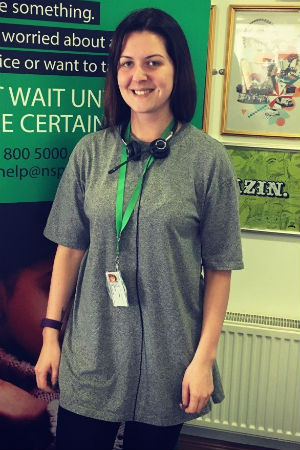Employers and Universities: Work with us?

60 Second Interview: NSPCC counsellor
At school, Laura was constantly changing her mind about her career plans, but she always knew she wanted to work with children.
In this week's interview, she shares her journey to become an NSPCC counsellor, and tells us about her amazing work helping to protect children from harm.

Name: Laura Halliday
Company: NSPCC (child protection charity)
Industry: Charity & Not-For-Profit, Social Care
What is your job? Counsellor: Helpline practioner
How long have you been doing this job? 1 year
Education
University: University of Central Lancashire
Degree subject: BA/BSc in combined studies, counselling and psychotherapy MJR, psychology minor
A-levels: Philosophy and ethics, history, maths, psychology (AS)
Professional qualifications: Level 3 diploma in childcare and education, NCFE certificate in the principles of dementia care, Chrysalis diploma in hypnotherapy and counselling skills, integrated advanced diploma in psychotherapeutic counselling
1. What was your very first job?
My very first job was at 15 years old working on a Saturday in a hair and nail salon sweeping the floor, I worked 9-5 and was paid £20 for the day.
2. What did you want to do when you were at school?
When I was at school I changed my mind weekly about what I wanted to do but I always knew that I wanted to work with children in some capacity.
3. How did you find out about the industry?
I worked as a volunteer for the NSPCC for a number of years before becoming a staff member and knew about Childline and what they did through advertisements and research.
4. How did you get there?
When studying in university as a counsellor I wanted to gain some experience in my own time and looked for voluntary opportunities, I chose to volunteer with Childline. I then applied for a position as a staff counsellor when I graduated. From working within Childline I became aware of the different roles and applied to be an NSPCC Helpline practitioner (a service adults can call when concerned about a child) as I wanted to be more involved in the child protection process as well as using my counselling skills.
5. What is a typical day like?
A typical day on the Helpline involves receiving calls and emails containing child protection concerns, I then have to assess the information and detail how it may impact the child’s overall development and relationships to others. This can involve working closely with children’s services and the police to assess immediate safety and share information.
6. What’s the best thing about your job?
The best thing about my job is hearing how things have improved for a family or hearing that a child is now safe from harm as a result of a call we have received.
7. What is the most challenging thing about your job?
As I work in child protection a lot of the things I hear on the Helpline are about the negative things people do to children and this can be tough to hear at times.
8. What advice do you have for people who want to do what you do?
Everyone at the Helpline comes from a range of different backgrounds and skill sets, this is incredibly valuable to what we do. My background is counselling and I was able to meet safeguarding requirements for the job. The role of a Helpline practitioner requires a social care, health or education qualification and experience of working where you have been required to respond to the needs of children in need of protection.
Having interests that help you cope with the things you may hear is useful and is one of the questions I was asked at interview. I regularly go to the gym which I find helps me switch off after work.
It can help to gain volunteer experience and Childline offer full training for volunteer counsellors, which may help gain experience in areas of child protection and risk assessment.
9. What things do you wish you’d known before starting your career?
I wish I had known the different routes into becoming a counsellor and been better informed of the options into the field as it may have taken me less time to be where I am now.
10. Where would you like to be in 5 years?
In 5 years time I hope to still be working to improve the lives of children.
Thanks Laura for sharing the wonderful work you do helping children across the country. If Laura's story has inspired you, find out how you can become a counsellor.
